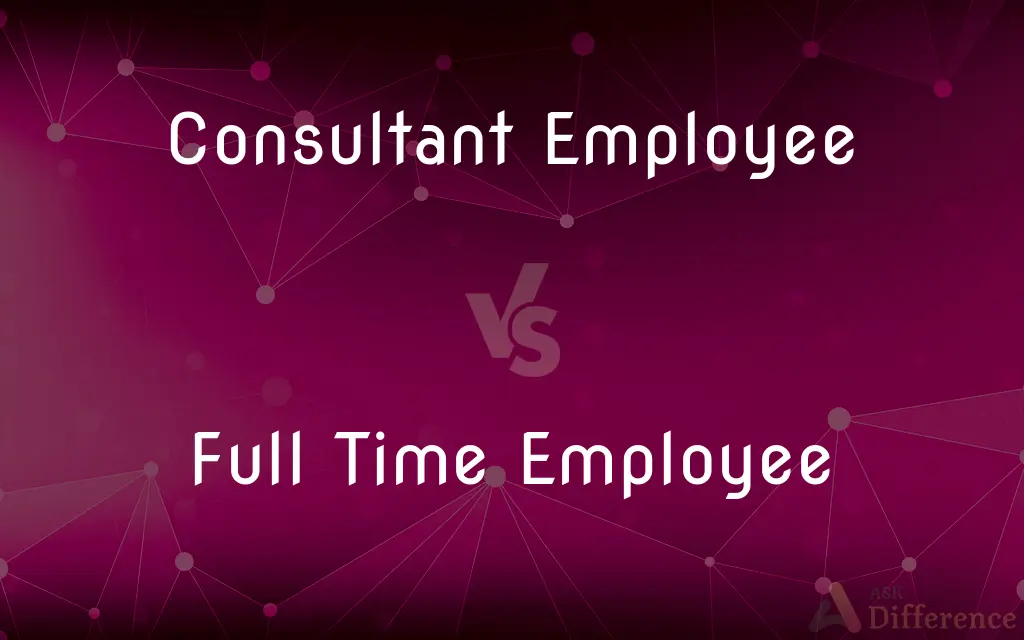Consultant Employee vs. Full Time Employee — What's the Difference?
Edited by Tayyaba Rehman — By Fiza Rafique — Published on November 20, 2023
Consultant Employees offer expertise for a project or period, usually without standard benefits. Full-Time Employees work for an organization regularly with benefits and consistent hours.

Difference Between Consultant Employee and Full Time Employee
Table of Contents
ADVERTISEMENT
Key Differences
Consultant Employees are experts hired to provide advice or services for a specific project or time frame, without the typical commitments associated with regular staff. Full-Time Employees, however, are integral to a company's operations, working set hours weekly and receiving full employment benefits.
Consultant Employees generally offer flexibility, aiding companies on an as-needed basis, typically without being entitled to benefits like health insurance, paid leave, or retirement plans. In contrast, Full-Time Employees are entitled to such benefits, as they commit to a long-term, consistent work schedule.
While Consultant Employees focus on specific project goals or organizational changes, bringing external perspectives, Full-Time Employees ensure the continuous functionality of an organization, often upholding its long-term objectives.
Consultant Employees may work for multiple clients simultaneously, offering specialized services. Full-Time Employees, on the other hand, dedicate their professional time entirely to one organization, often adhering to a contract and company policies.
The relationship between a company and Consultant Employees is often less legally bound compared to Full-Time Employees, who are directly employed by the company and subject to its workplace rules and regulations.
ADVERTISEMENT
Comparison Chart
Employment Structure
Contract-based, temporary
Permanent, long-term
Benefits
Usually none
Standard benefits (health, vacation, etc.)
Job Focus
Specific projects or objectives
Broad range of duties within a role
Employer Commitment
Low; multiple clients possible
High; dedicated to one employer
Legal Obligations
Governed by contract terms
Subject to employment laws and company policies
Compare with Definitions
Consultant Employee
A temporary hire offering industry-specific knowledge.
The technology startup relied heavily on Consultant Employees for software development.
Full Time Employee
A staff member working a minimum number of hours defined by their employer.
The position requires a Full-Time Employee who can work 40 hours per week.
Consultant Employee
An individual hired for a specific project or period.
As a Consultant Employee, Jane could offer her expertise to various organizations.
Full Time Employee
An individual employed under a standard workweek, usually with benefits.
As a Full-Time Employee, Mark enjoyed health benefits and paid vacation.
Consultant Employee
An external advisor hired for strategic guidance.
They brought in a Consultant Employee to navigate the company through a merger.
Full Time Employee
Someone fully integrated into a company’s daily operations.
Sara, a Full-Time Employee, attended all company meetings and events.
Consultant Employee
A specialist providing solutions to improve business operations.
The Consultant Employee identified key areas for cost reduction in the company.
Full Time Employee
A worker dedicated exclusively to one employer's objectives.
The Full-Time Employee was deeply involved in the company's long-term strategy.
Consultant Employee
A professional providing expert advice commercially.
The firm hired a Consultant Employee to overhaul its digital marketing strategy.
Full Time Employee
A permanent staff member with a continuous contract.
As a Full-Time Employee, he felt secure in his role and career progression.
Common Curiosities
Are Consultant Employees considered staff?
No, they're independent professionals and not considered part of the regular staff.
Do Consultant Employees need specific qualifications?
Often, they're hired for their specialized skills and experience.
Can Full-Time Employees freelance?
They can, but company policies or contracts may restrict this.
Are Consultant Employees responsible for their taxes?
Yes, they must handle their tax obligations.
Can Consultant Employees work for multiple clients?
Yes, they often provide services to several clients simultaneously.
Do Full-Time Employees receive employment benefits?
Yes, they typically receive various benefits like health insurance, paid time off, etc.
What's a typical workweek for a Full-Time Employee?
Usually, it's 40 hours over five working days.
Share Your Discovery

Previous Comparison
Submarine vs. U-boat
Next Comparison
Resupply vs. RestockAuthor Spotlight
Written by
Fiza RafiqueFiza Rafique is a skilled content writer at AskDifference.com, where she meticulously refines and enhances written pieces. Drawing from her vast editorial expertise, Fiza ensures clarity, accuracy, and precision in every article. Passionate about language, she continually seeks to elevate the quality of content for readers worldwide.
Edited by
Tayyaba RehmanTayyaba Rehman is a distinguished writer, currently serving as a primary contributor to askdifference.com. As a researcher in semantics and etymology, Tayyaba's passion for the complexity of languages and their distinctions has found a perfect home on the platform. Tayyaba delves into the intricacies of language, distinguishing between commonly confused words and phrases, thereby providing clarity for readers worldwide.












































